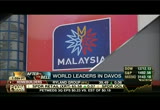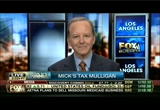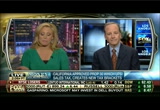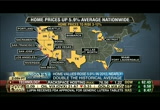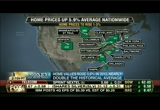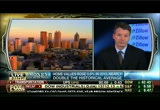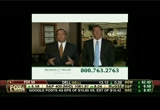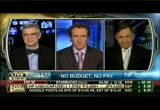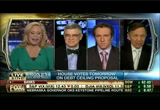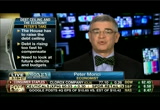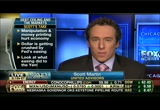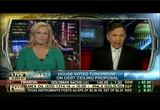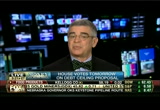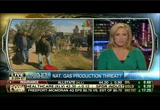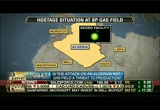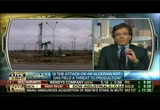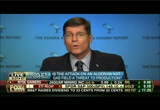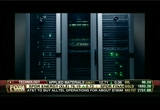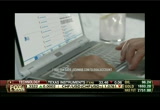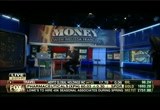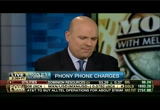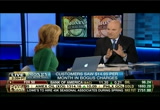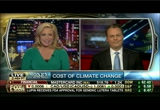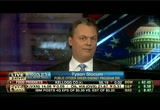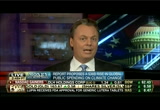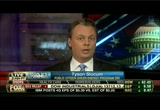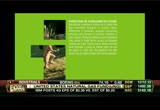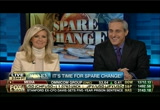tv MONEY With Melissa Francis FOX Business January 22, 2013 5:00pm-6:00pm EST
5:00 pm
continue. netflix is expected to report a loss of 60 cents and 905 million in revenue. lauren: the number one thing to watch tomorrow will be apple. earnings after the closing bell. the company has been under enormous pressure the stock is it down 30% over the past three months the company expected to report eps of 13.43 and $54.7 billion in revenue. analysts paying very close attention to iphone shipments, following reports earlier this week that demand has been weak. they will also be watching the company's gross margins. david: this may be the most important earnings report that apple ever filed. also tomorrow, liz will be joining us from the world economic forum in davos where she is talking to business and political leaders from all over the world, the people that really shape policies that affect us all. tomorrow at the 4:00 p.m. hour right here. she has the president of iceland. remember iceland was one of the first countries to be hit hard by the financial crisis but it has managed to come back. how? liz will be finding out. also she will take us inside
5:01 pm
the world of hospitality with two of the biggest names in the industry, the ceo and president of hilton and arne sorenson, the ceo of and president of marriott international. these two competitors are sitting down together with liz. you don't want to miss it. all tomorrow right here on "after the bell". lauren: "money" with melissa francis is next >> i'm melissa francis and here's what is "money" tonight. phil mickelson trying to take a mulligan for his comments on taxes. he will make drastic changes because of california's huge tax hike. what exactly does it mean? is he moving? is he retiring? sportscaster jim gray is sharing hints from mickelson as he joins us. 2012 showed the biggest spike in home prices since the summer of 2006 but there is still time if you want in. we've got the surprising inside scoop what is hot and what's not from coast to coast.
5:02 pm
iraq stumbles upon a billion barrels of oil they didn't even know they had. we have details whether that could be a global game-changer. even when they say it's not it is always about money melissa: first let's take a look at the day's market moment. a wild ride on wall street today. stocks reversed courses in midday trading with all three major indices ending the session in the green the dow ended up 62 points. travelers insurance reported fourth quarter results. the company still managed to post a profit despite increased claims from hurricane sandy. that is where the good news ended though. travelers profit for the quarter was down more than 50% from a year ago. the stock though closing up just over 2%. oil getting a boost today hitting a four-month high, closing at $96.68 a barrel. our top steer tonight.
5:03 pm
a superstar backing off comments he made about super high taxes. golf hall-of-famer phil mickelson worth estimated 150 million bucks. made it known the huge tax hikes in his home state of california will force him to make some drastic changes. here is what he said quote. if you add up all the federal, disability, unemployment, disability and state, my rate is 62, 63%. so i have to make some decisions on what i'm going to do. now mickelson is changing his tune a bit saying it was inappropriate to publicize his personal financial issues but he hasn't said he is staying in california. so will phil make a move? will other athletes living in high-taxed states follow suit? here with the answer is sportscaster and fox news contributor jim gray. and jim, i know you were texting with him. why do you think he backed off this? >> well, i think that he decided that tax and financial matters are personal matters and they shouldn't be out in the
5:04 pm
public's domain and he shouldn't be discussing what it is that he decides to do for he and his family and what what is best for him. he has taken the approach whatever he decides to do he will make his decision and will let all of us know. these are personal matters. athletes at time have to discuss their salaries and discuss what it is they do because they're so public. so he has decided this was a mistake and from this point forward he said at this time he will not discuss it any further. melissa: yeah. but when you look at the text of the interview, he made a number about comments. it wasn't just one comment. he sort of went on and on. it sounded like the frustration a lot of people feel. it makes a lot of sense. when you break it down and look at proposition 30 in california which raised the tax over a million dollars in the state. jumped to 13.3% from 10.3%. he made $60 million last year. that means that he paid an extra $1.8 million. i mean it is not chump change. i can see where his frugs station comes from. do you think it would be
5:05 pm
likely that he and other athletes would make decisions where they live the based where they're treated by the tax code? >> absolutely i think so and i think that you're seeing it with companies as well. melissa, it is even a bigger picture than that. you mentioned what he lost last year with the jump. he was okay with the threshold at 10.3%. perhaps when it went up 13.3 it caused him and a lot of others to look at this. if he was to go elsewhere and his salary was reported directly at $60 million, and i don't know whether that is accurate or not. i haven't seen his bank account and i haven't asked him what he made. it is not my business. melissa: right. >> just on the tax alone if he leaves california that is eight more million dollars a year. i don't know flip looking after his family and doesn't have to be here and income is not derived here but derived from all over the world and different corporations and sponsorship, he should seriously look like everybody else in business go elsewhere. a lot of people are going to texas and florida,
5:06 pm
particularly golfers and nevada a tennessee and washington where there is no state tax. melissa: they need warm weather to play golf year-round. a lot of places that would treat them a lot better. you mentioned texas and florida. one of the things he said strike as nerve with a lot of people he happens to be in a zone targeted both federally and by the state. you know it doesn't work for me right now. i am going to have to make some changes. as people see their federal tax rate go up. you can't do anything about that unless you are willing to leave the country and renounce your citizenship. you have to take a big step. we saw folks on facebook going public, some of those folks talking about leaving going to singapore. when you look at professional athlete, the one thing they do have control over what state they live in. and i wonder if you think, for example when someone is getting drafted and they're deciding do i want to play for 49ers or play for a team in florida or texas? you've been in the sports business for a long time. do you think that people would make decisions about what team they would go play
5:07 pm
for based on their tax status? >> of course they will. and that's why you see the migration away from california teams. when you're drafted you have no choice but when you become a free agent i believe in the future you will see guys going away from the los angeles lakers and the clippers and the golden state warriors and the san francisco 49ers and the raiders and the chargers. if they play in florida or go play in texas, that is 13.5% raise automatically. with the salary caps in professional sports there is no way for them to adjust to give them more for the state tax. it is an automatic raise. melissa i want to point out one other thing. tiger woods within the hour came out and said that is the reason he left california in 1996. not only does he like it in florida, one of the reasons but also a big reason is because of the tax circumstance. melissa: that is a great button on the segment. i didn't know that. that is perfect example. we've seen tennis players go down to florida and lots of people. it is classic. california thinks they're getting that extra $1.8 million but they end up losing out on all the income
5:08 pm
because people just leave. thanks so much for coming on the show. we really appreciate your insight. good stuff. >> thanks, melissa. thanks for having me. melissa: so if you can put aside the debt ceiling debacle and the fiscal cliff fiasco there is actually hopeful news in the housing market. cillo says last year national home values rose almost 6%, nearly double the historical average. we haven't seen annual gains like that since the peak of the housing bubble back in '06 but exerts say it will not last. we want to make sure our viewers on "money" don't his the boat. we have zillow's chief economist, here in a fox business exclusive. great to have you back on the show, stan. let me start with why you think this can't last. >> great to be here, melissa. yeah, definitely, to see 6% appreciation nationally first year after the housing market reached a bottom is somewhat unprecedented from what most economists were
5:09 pm
expecting given the high foreclosure rate and negative equity rate. the negative equity rate is contributing and price spikes. people can't sell their houses even though there is new demand moving into it. the only way markets respond is by the price spikes. that's why we're seeing price spikes above 22% in places like phoenix and above 14% in las vegas. we're definitely seeing some extraordinarily positive price appreciation in markets right now. the trouble is that it is not really sustainable. at some point the negative equity will erode. people will put their homes up for sale. we should see more supply in the marketplace. melissa: yeah. also, existing home sales numbers were out today. that showed a little bit of a month-over-month decline although year-over-year it was much better. there is so much noise i feel like it is conflicting. right now you feel like we're definitely on the up swing overall in housing would you say? >> yeah, i think generally we're pretty optimistic about the trajectory of housing right now. and, you know, you do have to in terms of home sales being down between november
5:10 pm
and december, that one percentage point blip is better to look at longer term perspective what is happening year-over-year and year-over-year, throughout the, throughout all of 2012 we saw 12 to 15% more demand than we did the prior year. so demand is definitely returning. in fact, in a lot of parts of the country we have, we're seeing inventory constraints and that's why we're seeing new construction start up in earnest in a lot of parts in california. melissa: sure. we're looking the a map right now that shows where some of the strongest and weakest places in the country are right now. before i get to where you think the opportunities are, where do you see the strength and why do you think that is? looks like a lot of places that were hard hit like florida and california? >> yeah, that is definitely the common denominator, places that were really hard hit. think florida, arizona, nevada, california. those places where you've seen enormous resets in home prices. those are many is places responding the best right now. that is because affordability is all-time highs.
5:11 pm
prices reset in some cases more than 10 years. pair that with mortgage rates which are well below 4% now. it sets you up for historic affordability. melissa: talk to me about where opportunity still exists. i hate when i hear about where i missed an opportunity and there is no, way to get in and make money for myself? >> well, i mean essentially, you know, if you're thinking about getting in the market and you're already in the market then the best time to have gotten in would be nationally at the bottom which was october of 2011. so essentially you're already a year past that. melissa: i don't want to hear about that! where is there still opportunity? you think you expect new york, atlanta and chicago to rise? you think there is still good opportunities there? >> that's right. of those three, new york, chicago, and atlanta those are interesting markets because they're ones that are still seeing home price depreciation in many parts of those markets and are definitely the laggards of the top 30 metro. those are praises where the home market, the housing market is not yet fully recovered. we still have a lot of
5:12 pm
foreclosures and a lot of negative equity. they will do quite well. they will do okay in 2013. they will do better after that. all three markets. at least chicago and new york are a little more, have more headwinds and they're in, they have a lot of judicial forechrous sure, processes which means there is a long pipeline of foreclosures. that tends to cloud the markets a little bit. melissa: why are you so positive on atlanta? >> well, atlanta i would say has had a very long housing recession. it has been a little bit of a sleeper in terms of hard hit markets. typically we talk about vegas, phoenix, miami, stockton, california, but atlanta has had a very long and hard housing recession. if you look to prices at historical levels in terms of incomes and rents atlanta is looking pretty good. i think atlanta had a lot of bank failures in the state of georgia and they have a lot of foreclosures but steams investor activity is moving out of phoenix and
5:13 pm
vegas and moving to atlanta. melissa: thanks for coming on. we appreciate your time. good stuff. >> thanks for having me, melissa. melissa: tomorrow is the big day, the house vote on extending the debt ceiling. there is a catch. that means lawmakers won't get paid unless they actually pass a budget. i love it! our panel joins us with their best strategy and the outcome for both the market and the economy. don't go anywhere. more "money" coming up. ♪ twins. i didn't see them coming. i have obligations. cute obligations, but obligations. i need to rethink the core of my portfolio. what i really need is sleep. introducing the ishares re, building blocks for the heart of your portfolio. find out why 9 out of 10 large professional investors choose ishares for their etfs. ishares by blackrock. call 1-800-ishares for a prospectus which includes investment objectives, risks, charges and expenses. read and consider it carefully before investing. risk includes possible loss of principal.
5:17 pm
lori: all right. back to business in washington now republicans hold a big vote to whether or not to extend the debt limit until may. if congress doesn't pass a budget by april 15th they no longer get paid! i have no problem with that. our panel is here with their take on the strategy. we have our favorite economist, peter morici. the always amazing scott martin, chief market strategist with united advisors and former democratic congressman and brand new fox news contributor. dennis kucinich. so glad to be here. >> good to be with you. melissa: i will start with you, since you're brand new.
5:18 pm
what do you think? is that a powerful motivator that they will not get paid? >> this issue of the debt is something that congress dealt with 52 times since 1978. it is an obligation to raise it because we have to cover the spending that already has been accomplished. now, keep in mind that the millionaires in congress wouldn't be hurt by such a proposal. melissa: no. >> there are plenty of millionaires but the people that depend on a paycheck, i don't think that we want to start a precedent where we startlinging members votes to how they vote on a specific issue. that's a very dangerous thing. but, look, should we do something about spending? you bet we should but the debt limit is really the wrong place to have a debate where you start to defeat the country's economic position. >> that seems like unrelated issues. before my banker would give me more money or before american express would raise my credit limit they would want to know how i plan to live within my means in the future. >> they are related but i'm
5:19 pm
saying that we have to take in context where we are right now with our economy. our economy is just at the threshold of a recovery. this would, markets would react what we're doing. melissa: okay. >> we would see unemployment continue to be a major factor. and when you look at the trade deficit we have, which peter morici more than anybody has tracked, we, we have issues dealing with our economy. we aren't dealing with. spending should be --. melissa: absolutely are. >> don't go putting us in the tank here. melissa: what is the best outcome for the economy with the debt limit debate? >> we certainly have, the dennis is right they have to raise the limit right now. however, i think that linking the next extension with passing a budget is a good thing because after all, how much you raise the limit is going to be a function of how much you intend to spend more than you take in. and so, we do at some point have to get to disciplining spending and linking it to how much additional we borrow.
5:20 pm
i think that is a reasonable thing to do. so i like the strategy of, you know, may 1th. -- 19th. that said, we really can't reduce the deficit a lot unless we do something about our budget deficit. you see, the trade deficit. the trade deficit detracts from demand. the budget deficit adds to demand. if you're going to reduce that addition, you have to reduce that subtract sun. melissa: i don't know. seems like we've got to stop spending. scott martin, bring you into the discussion. what do the markets want to hear? >> that is the crazy thing the markets want, spend, spend, spend. if you were an alien looking down on markets and economy and look down on the markets and the debt ceiling you saw every time we extend the debt ceiling the markets pretty much went up which they have done last several times, you would say, okay, this is how we get the stock market to go up. that is crazy thing. melissa: why, why? why does that happen? is it that people trading in the market can't see we will ever have to pay this bill down the road?
5:21 pm
why does the market rally when this happens? >> i think it is twofold. one of the things that happens, melissa, it absolutely destroys the dollar. if you're an s&p company trying to sell your goods overseas it actually helps you that the dollar goes down in value because the foreign purchasers have more purchasing power to buy your goods. you but it is a dangerous game to, well, let's pass the debt ceiling extension but deal with it the next time. we were here in august of 2011. we had the "gang of six", we had the super-committee, all these smart people that were supposed to come up with a resolution how we're not getting back to this spot and guess what? we're here. melissa: absolutely. dennis i will kick it back to you on that one. everyone thinks this sound like, i don't want to say it is, such a cliche, kicking the can down the road again. >> we have to deal with this, this is wasteful spending. we have an element no one is talking about i want to introduce on the show. you have exponential growth of debt due to compounded interest.
5:22 pm
we have structural problems the way we handle our money system. this is something that we're going to have to address sooner or later. you can kick the can down the road but we'll still have debt. we have to deal with the underlying issues how these debts are created. cut the wasteful spending but also look at the, at the system that we have that causes the debt to grow exponentially because of the come pounded interest. melissa: peter, i'm worried we're in real trouble here. seems like we're not tackling this problem. >> we are in real trouble. we're to the point where raising taxes alone will not put us in a position where we can get our debt and deficit growth under control. you know if we raised everybody taxes by 25%, we wouldn't raise enough taxes to solve the deficit problem but yet we throw the economy into a terrible recession. by first principles, you must spend less money. melissa: yeah. >> this goes back to not dealing with the structural problems that are causing the economy not to grow. melissa: right. >> we could go down that whole litany but the president's speech yesterday
5:23 pm
was surely not about growth. melissa: yeah, that's true. guys, thanks so much for coming on. i wish we had more time. you guys didn't get to talk enough. we'll have to do it again soon. >> thank you veryymuch. melissa: coming up for the first time in 30 years iraq makes a oil discovery. good things come to those who wait, because you won't believe how much they found. could this turn the global oil market on its head? we have the answer coming you. do you ever have too much money or too much oil? ♪ i had enough of feeling embarrassed about my skin.
5:24 pm
[ designer ] enough of just covering up my moderate to severe plaque psoriasis. i decided enough is enough. ♪ [ spa lady ] i started enbrel. it's clinically proven to provide clearer skin. [ rv guy ] enbrel may not work for everyone -- and may not clear you completely, but for many, it gets skin clearer fast, within 2 months, and keeps it clearer through 6 months. [ male announcer ] enbrel may lower your ability to fight infections. serious, sometimes fatal events, including infections,
5:25 pm
tuberculosis, lymphoma, other cancers, nervous system and blood disorders, and allergic reactions have occurred. before starting enbrel, your doctor should test you for tuberculosis and discuss whether you've been to a region where certain fungal infections are common. you should not start enbrel if you have an infection like the flu. tell your doctor if you're prone to infections, have cuts or sores, have had hepatitis b, have been treated for heart failure, or if you have symptoms such as persistent fever, bruising, bleeding, or paleness. if you've had enough, ask your dermatologist about enbrel.
5:27 pm
melissa: turning to middle east oil now. whether the deadly attack at a natural gas plant in algeria will have any impact at all on the oil industry as a whole, joining me with their expertise is the founder and president of the american islamic forum and oil expert steven schork of the schork report. welcome back to the show. we have two interrelated
5:28 pm
issues i want to kind of tackle at the same time. you know, you hear about this report out of iraq. they have stumbled upon another billion barrels of oil, which we heard about iraq. there was all this oil and so much fighting going on top of it. if we could get there there is a treasure trove. you hear what is happening in algeria and how dangerous it is reminds you to get oil out of the ground in this area. i wonder if it signals a new war on oil assets there? what do you think? >> well i do think the algerian situation should signal there is a vacuum in northern africa. the group that committed these atrocities were jihadists from libya, tunisia, from egypt and from all over the place and the bottom line is what is happening in mali is the destablizing the mali government. now nearby regions are seeing that there is a north african movement of islamism, or islamist. they're seeing weakening governments. they're using economic interests and foreign nationals as weapons because the biggest threat to the
5:29 pm
jihadist movement is western interests in the area and if they can get us to pull out, get france and europe to pull out, companies like this algerian gas company that was working with british and working with the norway statoil, if they can get them to pull out they will be more able to establish a foothold like they have done in mali and continue to spread into this vacuum that we have been completely missing in action with. melissa: steven, when you hear about the billion barrels in iraq, do you discount it because he hear about attacks like this in algeria? you realize again, just how difficult it is to get this oil to market? >> well, indeed. the situation in algeria, melissa, reminds us how vulnerable these situation situations in north africa is as your guest just said. two years ago with the libyan civil war a significant amount of libyan oil went missing from the market and was chiefly responsible for a 35% rise in oil prices at the start of the summer. going back to iraq, you have a country with 14 billion
5:30 pm
barrels of recoverable oil. they're the fourth largest reserve in the world and still can find another billion barrels out there? melissa: right. >> just again, knocks out the leg from the myth of peak oil. bottom line is, prices are high enough that the incentive is to start looking for this stuff and we're getting it out of the ground. whether iraq, algeria, libya, these are very vulnerable situations. this is why we should all hail the decision to finally go through with the keystone pipeline, which again, will make the united states and north america, less dependent on libya, on iraq, on al sphere yaw for the oil and more dependent on the stuff we can pull out of our own ground. melissa: you're talking about the governor of alaska saying he aproves the new plan to go around the area that had been, you know, designated as a no-go zone in nebraska for the xl pipeline is up to the president to approve these plans. we have a long way to go.
5:31 pm
let me kick it back to you. seems like we maybe have less influence in the area than we ever did before and look at the situation in algeria, we were basically locked out of having any influence on what went on once the situation blew up and there were americans in the area. >> absolutely. nature abhores a vacuum. in every country you see a vacuum happening and into that void is coming the islamists. even this find of oil in iraq, it was near the iranian border. just today on press tv, the iranian energy minister say this is share reserves. they want to move in. the context in iraq a kurdish conflict within are with the kurds have cut down their oil production from 100,000 barrels a day to 5,000 because they don't want baghdad to control it. so baghdad says, look, we found oil. we'll not be as dependent on the kurdish region. into this conflict america has been missing in action and iran is going to fill those voids if we stay
5:32 pm
asleep against political islam and its interests. melissa: steven, you make the great point this means that we should be more dependent on ourselves than ever before. we need the pipeline, but also pushes the focus to fracking and to shale. i worry especially with the president's speech yesterday and with the turnover that we're about to see at the department of energy that maybe we're going to see a crackdown on fracking and on shale here in the u.s. that really goes against our own self-interests. >> well, it really would. it really would be a shock, melissa if the president did many could out now especially after the governor who, by the way was against the excel pipeline but now he is for it. that pipeline is going over the same aquifer just in a different region of the at the end of the day they realize how important this is. u.s. crude oil production is up 25% over the past five years. melissa: yeah. >> that is 1.3 million barrels a day of oil that we are now producing that we do not have to import from hugo chavez, from nigeria or from
5:33 pm
algeria for that matter. this is indeed we're growing our own resources. it gives us a tremendous leg up. it will be especially if you look at of course with what is going on in algeria, the kurdish situation in iraq. look what is going on with china and japan. they're fighting over iraq in the south china sea all because of oil. if we do not exploit our own resources we're certainly setting ourselves up. melissa: we're in big trouble. >> for a significant run-up in price. melissa: gentlemen. thanks so much. >> thank you, melissa. melissa: time for today's fuel gauge report. as we mentioned moments ago huge news on the keystone xl pipeline. today, nebraska governor dave heineman approved the new route. in a letter to the president, secretary of state --, and the secretary of state, he confirmed that he supports a proposed rule around environmentally sensitive areas in nebraska. the controversial project is now in the hands of the state department which says
5:34 pm
it will not complete the keystone review in the first quarter of this year. the fight over exporting natural gas is heating up. the chemical company, huntsman corp, joined a coalition campaigning against more foreign sales of fossil fuel. the energy department is currently reviewing applications for more than a dozen companies to sell up to 22.6 billion cubic feet of natural gas a day. u.s. taxes on chinese solar products are making an impact. government statistics show impacts of chinese solar cells and panels fell to the lowest level in two years. that was in november. the imports valued $50.5 million which was less than 1/5 of the $278 million total from october of 2011. up next on "money", want to save almost $200 a year on your phone bill instantly? stay tuned for a scam you might be victim too without even knowing it's happening. "piles of money" coming up. ♪ . ♪
5:35 pm
5:36 pm
whatever your business challenge, dell has the technology and services to help you solve it. tdd#: 1-800-345-2550 after that, it's on to germany. tdd#: 1-800-345-2550 then tonight, i'm trading 9500 miles away in japan. tdd#: 1-800-345-2550 with the new global account from schwab, tdd#: 1-800-345-2550 i hunt down opportunities around the world tdd#: 1-800-345-2550 as if i'm right there. tdd#: 1-800-345-2550 and i'm in total control because i can trade tdd#: 1-800-345-2550 directly online in 12 markets in their local currencies. tdd#: 1-800-345-2550 i use their global research to get an edge. tdd#: 1-800-345-2550 their equity ratings show me how schwab tdd#: 1-800-345-2550 rates specific foreign stocks tdd#: 1-800-345-2550 based on things like fundamentals, momentum and risk. tdd#: 1-800-345-2550 and i also have access to independent tdd#: 1-800-345-2550 firms like ned davis research tdd#: 1-800-345-2550 and economist inteigence unit. tdd#: 1-800-345-2550 plus, i can talk to their global specialists 24/7. tdd#: 1-800-345-2550 and trade in my global account commission-free tdd#: 1-800-345-2550 through march 2013. tdd#: 1-800-345-2550 best part... no jet lag.
5:37 pm
5:38 pm
[ slap! ] [ slap! slap! slap! slap! ] ow! ow! [ male announcer ] your favorite foods fighting you? fight back fast with tums. calcium-rich tums starts working so fast you'll forget you had heartburn. ♪ tum tum tum tum tums melissa: might hear of scams all the time and secretly congratulate yourself you haven't fallen prey to whatever it is. a montana family and their accountant are accused of tacking on $70 million in
5:39 pm
bogus charges on customer phone bills across the country. you might be paying it without realizing it. the sands family have nine companies for voice mail and electronic fax services and charging people average $15 a month for phony services that is $200 a year. here with details as well as how to protect yourself is defense attorney arthur eye dalla. thanks for tackling this one today. what freaks me out about the scam, you know when you get the phone bill there are 6 how things. 1.99 for this, 4.99 for this and they all look fake. >> winds up like 234. melissa: they all look bogus to me. this was another one 14.95 at the end of the bill, right. >> they had all these companies. they use a different one on each bill, like american e-voice or global voice mail or hear for you, or whatever. they had 120,000 humans who they were giving these voice mail accounts to, charging
5:40 pm
$14.95 and of the 119,000 people, 12 customers actually used the e-mail. melissa: wow. >> the voice mail. i apologize. so, what is --. melissa: there was some legit service in there somewhere. >> that would be the defense at trial. look, we provided service. interest was their fault for not using the service but it was service you probably didn't ask for, you didn't sign up for. they use a complicated system of, what i would call layering to, from one company to another company, to get into your phone bill because apparently, like a go between between the phone company and you. melissa: yeah. >> and, it added up to millions of dollars. now they have returned a lot of the money. and what the feds are doing in strategic way, they started a civil case which allows them to subpoena everything. once they subpoena all the record, my guess is the civil case will go by the wayside and there will be a criminal case many coming in. this family is in big
5:41 pm
trouble. melissa: everybody has paused their television because we're watching on dvr. they have run off to see, look at their phone bill. what are you looking for? >> what are you looking for? if you see, have a verizon bill or at&t bill and see like another company under there, it should raise an eyebrow. won is called network assurance. i could tell you on my cell phone bill i pay extra 5.99 if i lose my phone. i get a free phone back. that is assurance plan. but i know about it. makes sense to me. but if you see another 15 bucks for global voice mail, wait a minute. verizon has voice mail. at&t has voice mail. all the people have voice mail. you have to pick up that 800 number can i ask you what this is. melissa: until they answer and go through tell you what it is. you have to deal with the pain. >> melissa francis while you're on hold. melissa: you could watch with me. that is great idea. i love that. my question was, and we don't know the answer to this i don't think unless you're in the minds of the criminals or get wonder woman's lasso and wrap it
5:42 pm
around them to make them tell the truth, okay. >> that is --. melissa: you would have wonder woman, what are you going to do. we don't really know, were they in league with the phone company? how did they get in there on the bill? >> my understanding is there's a middle company between the phone company and what arrives at your, the phone bills i don't believe are generated directly from verizon and at&t. there is someone else who actually does that they got in there somehow and got on your phone bill. melissa: wow! arthur, thank you so much. you don't want wonder woman's magic lasso. >> i'm all about that shazam? you remember shazam? aquaman. i'm all about that stuff. melissa: here is our "money" question of the day. have you ever seen charges like this on your phone bill? so far none of you said yes but i'm betting everyone is checking from now on. we want to hear from more of you. like us on facebook at facebook.com/melissafrancisfox or follow me on twitter
5:43 pm
@melissaafrancis. >> coming up on "money", have you learned, we, i mean the world, need to spend $700 billion a year to fight climate change? because there is so much money sitting around with nothing to do. we'll be back who will pay to green the economy. it is all about money. ♪ . (announcer) at scottrade, our clients trade and invest exactly how they want. with scottrade's online banking, i get one view of my bank and brokerage accounts with one login... to easily move my money when i need to. plus, when i call my local scottrade office, i can talk to someone who knows how i trade. because i don't trade like everi'm with scottrade. me. (announcer) scottrade. awarded five-stars from smartmoney magazine.
5:44 pm
5:47 pm
♪ . melissa: the world economic forum begins in davos, switzerland, this week the organization releases a new report saying the world needs to spend an additional $700 billion a year to combat fossil fuels. not surprisingly countries are heavily divided who is responsible for paying to lower emissions and greenhouse gases. joining me, tyson slocum, director of the green energy program at public citizen. tyson, welcome back to the show. >> great to be here, melissa. melissa: i wonder how many people flew in on their private jet to make this declaration. what is the carbon footprint of the davos summit, anyway, what do you think?. >> i'm sure it is large.
5:48 pm
that $700 billion green investment figure, not all of that is public money. what the study talks about is that right now world governments are spending about $90 billion a year on sustainable energy infrastructure investments and they're talking about increasing that by about $35 billion a year. melissa: why? why? why do we need to spend more money on this? >> because it is very clear we need new invest in more sustainable energy infrastructure that in the long term is going to deliver the kind of lower-priced energy and cleaner communities that we all want to have. and so this talks about what, it will take globally. but the vast majority of that $700 billion figure is going to come from private capital markets. the same way that the vast majority of comes from today. melissa: only way you incentivize people to pile in money is if they will make money.
5:49 pm
>> that's right. melissa: if they're not coming to the table because they don't think it is a profitable market. i don't know how the government fixes that because that seemed to be sort of the direction, this is going. for example, if you look at the carbon trading market in europe, it has collapsed because they threw so many carbon credits into the market the price collapsed and it has been a total fiasco. that was the government trying to create and rig a market. they can't do it. >> well, i'm not talking about rigging a market. what i'm talking about is, laying the foundation for improved access to the market for emerging technologies. melissa: what does that mean? how do you do that? >> well, for example in the transportation sector which represents a third of greenhouse gas emissions, private capital will not build the mass transit systems or high-speed rail networks. it is going to have to come with, with some public money. there's a lot of folks out there that would love an alternative to $4 a gallon gas.
5:50 pm
you have to have a public infrastructure investment. melissa: you're talking about tax dollars. and what worries me about this, we don't have any tax dollars right now. i don't know, i'm sure you know that we have a $16 trillion debt here. so when we're talking about spending more tax dollars, would, if we were going to spend more, would they be better spent on say, retraining people to fill the jobs that we have that are open in this could not my when we have 22.3 million people unemployed and need more work? maybe we should be training them to be engineers or to work with computers or be mathematicians rather than spending money on climate change? >> well, first of all, spending money on climate change is a job creator. if you're an installer of solar panels on buildings and homeowners roofs that is not only going to increase the energy independence of your average family, it is also going to create jobs. to retrofit existing structures like our offices and our homes, to make them more energy efficient, that
5:51 pm
provides huge financial savings to families and also creates jobs for the companies providing those retrofits. melissa: i don't know. if that were true, private companies would be doing it and making money. it is not -- >> well they are. right now, we're talking about scaling it to a much larger degree. melissa: tyson, you're a fantastic sport and wonderful opponent. thank you for coming on. we appreciate your time. >> always my pleasure. melissa: mine too, actually. up next, anyone who thinks it is better to be single than married, we have news for you. chew on this. single folks will spend a million dollars more in their lifetime than those with the old ball and chain. stay right where you are and find out why. you can never have too much money. unless you get maried i guess. ♪ . twins. i didn't see them coming.
5:52 pm
i have obligations. cute obligations, but obligations. i need to rethink the core of my portfolio. what i really need is sleep. introducing the ishares core, building blocks for the heart of your portfolio. find out why 9 out of 10 large professional investors choose ishares for their etfs. ishares by blackrock. call 1-800-ishares for a prospectus which includes investment objectives, risks, charges and expenses. read and consider it carefully before investing. risk includes possible loss of principal. at legalzoom, we've created a better place to handle your legal needs. maybe you have questions about incorporating a business you'd like to start. or questions about protecting your family with a will or living trust.
5:53 pm
and you'd like to find the right attorney to help guide you along, answer any questions and offer advice. with an "a" rating from the better business bureau legalzoom helps you get personalized and affordable legal protection. in most states, a legal plan attorney is available with every personalized document to answer any questions. get started at legalzoom.com today. and now you're protected.
5:54 pm
omnipotent of opportunity. you know how to mix business... with business. and you...rent from national. because only national lets you choose any car in the aisle. and go. you can even take a full-size or above. and still pay the mid-size price. i could get used to this. [ male announcer ] yes, you could business pro. yes, you could. go national. go like a pro.
5:55 pm
♪ melissa: all right. time for a loaf fun with "spare change." today we are joined by author and radio talk-show goddess demonic crowley. and adam shapiro. that is everyone agrees with you wherever you go goddess. >> everywhere. melissa: first up, check this out. inaugural luncheon. this is michelle obama, feasting away and rolling her eyes.
5:56 pm
he -- she does a bunch of times as the judge with the president. once this over and over again. she just keeps shoveling, i've been there. i understand that. this means they have been starving her all day. she's been going through it. she rolls her eyes like three different times and six ahead. >> yes. she shakes her head like look at this. how sad and pathetic. i'm going to eat more. melissa: there you go. >> expected to signal talk to the hand. >> but she knows she's being watched preachiness their cameras everywhere and she still just doesn't care. at the industry thousand calorie lunch. and don't care what anybody thinks. and he's lying. melissa: he's also saying, that thing again. yes. moving on, it took police to discover that former french president nicholas sarkozy and
5:57 pm
his wife are planning to move to london to escape that 75 percent tax rate. that's not all. also plans to set up a billion dollar private equity fund. there is so much about this. i hardly know where to start with this. >> would you invest? you know, no one moves from france to london for the food. that's for sure. he has to be trying to get away from something. he's under investigation. so that's the bigger headline. out of town before the king clampdown on him. >> and this is of the discovered the move. this fraud squad moved in and found that he was planning this move to london. his wife had a long affair with mick jagger, says she is very -- >> when they go to london. >> adelle think he can get a russian passport the way depardieu did. melissa: i don't know. if you looked at some of the details of the fraud cases seems like he can get anything. you get all kinds of money from
5:58 pm
different people. >> and a former president can still run a hedge fund or an equity fund. you'll be fine. >> unlike most, will produce much result. >> until be fine. melissa: next up, sorry to all the single folks, but new endo shows that in america it pays to be married. don't laugh. if you are single you will pay a million dollars more of real-life time than those of less merry suckers. the main reason is because there are at least 1,000 laws that give financial benefits to marry couple's. >> i'm single and i'm thinking, do i make enough to have to pay a million dollars? it's a no-brainer. melissa: we go out every friday and saturday. among very expensive white. my husband is not saving any money by being married to me. that's for sure. >> there are all kinds of tax incentives for married couples and so one.
5:59 pm
how they file in their property and so on. so to be single really is kind of expensive. melissa: but with it? i don't know. >> put the toilet seat down. >> that's critical. that right there is worth a million dollars. it. melissa: all right. a group of investment managers, a group of students and the cap. guess which one comes up with the best dog picks? of course is the cat. that was so obvious. during his favorite toy mouse on a grid of numbers allocated to all the company's. the cat one buy nearly $8,871. nearly 600 more dollars than the investment bankers. the thing and going to call a cab for nylon. >> with the exception a broken clock is correct twice a day. >> beat the students and the brokers. the cat didn't come in second. it took the whole thing. >> did this every ten years and see if the cat beats th
90 Views
IN COLLECTIONS
FOX Business Television Archive
Television Archive  Television Archive News Search Service
Television Archive News Search Service 
Uploaded by TV Archive on

 Live Music Archive
Live Music Archive Librivox Free Audio
Librivox Free Audio Metropolitan Museum
Metropolitan Museum Cleveland Museum of Art
Cleveland Museum of Art Internet Arcade
Internet Arcade Console Living Room
Console Living Room Open Library
Open Library American Libraries
American Libraries TV News
TV News Understanding 9/11
Understanding 9/11
